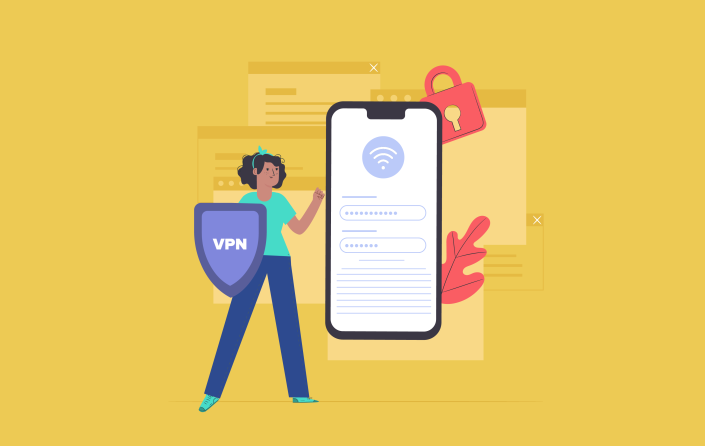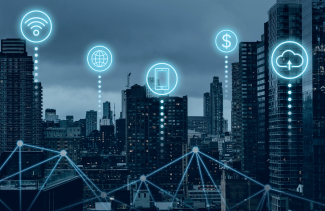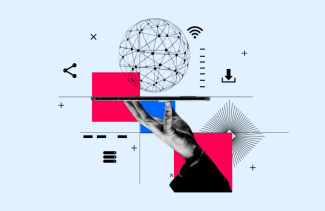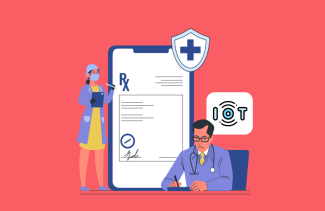
Virtual Private Networks (VPNs) have become synonymous with data security and privacy. They help you encrypt online activities so you can avoid cyberattacks, remain anonymous, and prevent spying. The major purpose of a VPN is to build a secure connection between an online user and the internet.
Understanding VPN’s
VPN’s are basically virtual private networks that are created as a private network from a public internet connection. VPNs mask the network's internet protocol (IP) addresses of the user so the user’s online actions become virtually untraceable for the hackers and other online entities looking to collect data.
But, how exactly does VPN protection secures us from hackers or intrusive advertisers? In this article, you will find out,’ what do VPNs do and what are their major benefits’? So, let’s get started!
What Do VPNs Do?
While surfing the web, you make your personally identifiable data, such as your browsing history, credit card information, login information, downloads, or chats available to anyone. This is particularly true for searchers using public Wi-Fi hotspots. If your online privacy and security are important to you, then you should certainly invest in VPN protection for your data. Another important question herein is that, ‘how does vpn make public wifi safe’? A VPN encrypts your online data and creates a secure network out of the public networks. Simply put, it builds a kind of a tunnel that prevents advertisers, cybercriminals and service providers from tracking and using your sensitive data, even while working in a public wi-fi zone.

What does a VPN Protect You From?
VPN protection basically enables good privacy on the internet. Therefore, searchers use VPNs for multiple reasons, such as accessing restricted entertainment data, remaining anonymous online, accessing work-related sensitive data, torrenting, or hiding browsing activities from authorities. Obviously, most of these uses of VPNs revolve around the same thing –maintaining users’ data safety and anonymity. Here is how VPN protects you, protects internet privacy, and provide online security.
How Does a VPN Protect You during Online Activities
Do you shop online? Do you check your bank account from your mobile phone? Have you ever used a public Wi-Fi hotspot to access your email or social networks? While those are ordinary daily activities for most of us, they may compromise your online security and expose your most sensitive data to hackers. This particularly applies to users relying on public Wi-Fi.
So, what is VPN protection and how is it helpful in such a scenario? By encrypting your data traffic, it will make your data indetectable by hackers. Apart from preventing data theft and cyberattacks, powerful VPN protection also ensures that the websites collecting your private data cannot track your device.
How does a VPN Protect You while Torrenting
Torrenting may compromise your online safety and privacy in multiple ways. First, while downloading a file, you may run into malware and infect your entire network. Second, P2P sharing exposes your online data while downloading a file. The major disadvantage of torrenting is, unsurprisingly, legal issues. While torrenting is not illegal, downloading copyrighted materials is. Your internet service provider (ISP) and copyright trolls are constantly monitoring torrenting sites and identifying users that are downloading files illegally.
To keep torrenting safely, you need to invest in VPN protection. It will hide your IP address so your ISP will not be able to track what you are doing online. It enables secure vpn free online privacy. To get the most out of your torrenting activities and take security to the next level, always choose VPN protection with the safest ciphers and secure protocols.
How does a VPN Protect Privacy?
In the online landscape, privacy does not exist. Websites, apps, advertisers, and social media platforms are continuously collecting, analyzing, and even monetizing your personally identifiable data. They want to know everything about you – who you are, where you live, what content you like, what you do – so they can provide you with more targeted content. The introduction of the General Data Protection Regulation (the GDPR) has raised people’s awareness of how exposed their sensitive data is.
The GDPR goes far beyond data security and privacy. It also gives online users multiple opportunities to control, monitor, and even delete their personal data using anonymization, pseudonymization, and encryption.
So, ‘how does a VPN protect me in this situation’? With VPN protection, you are essentially hiding your location from advertisers and preventing them from serving content based on your location. All you need to do is connect to a server in any country or region provided by your VPN provider.
Ways a VPN Protects in the Online Space
Today, we have moved most of our daily tasks and activities online. We pay bills online, make purchases online, upload work-related data to the cloud, and use social media apps to chat with friends. Reports suggest that by 2026, nearly 73% of the world will access the internet solely via their mobile devices.
With millions of hackers online you need to protect your data and secure each device you are using. For example, if you are using VPN protection on your desktop computer and you do not protect your laptop, tablet, or smartphone, you risk being hacked. So, ‘do VPNs protect you from hackers’? The answer is ‘Yes’. That is why you should use VPN protection on each device you use. Always choose a VPN provider that enables several simultaneous connections.
The Key Elements of a VPN
Now that you understand what VPN protection is, how it works, and what does a VPN protect against, it is time to discuss the most essential components that make up a powerful, user-oriented VPN. Below are some of them:
1. Fast speeds:
Using VPN protection can sometimes decrease your internet connection speed. Precisely because of that, you should pick a VPN provider that has lots of servers and offers unlimited bandwidth.
2. Are VPNs really secure? :
VPN’s basically encrypt data and make it unreadable for the hackers and other online entities. The technology utilizes sophisticated ciphers, such as 256-bit AES encryption, RSA, or Twofish; wherein without the appropriate key; data can in no way be accessed. This makes VPN protection one of the safest modes to protect data.
3. How does VPN protect privacy?
Data Security becomes a more sensitive issue, when you are transferring data packets across a network. Since the network itself can track your activity, so can your internet provider who might be owning the network. There exist secured protocols and sets of instructions that are applied by VPN’s once the connection between two devices is established. It helps the VPN networks to protect privacy. Some of the most secure options herein are IKE2, SSTP, or OpenVPN.
4. Does the VPN has a history?
The fact is that there is nothing like truly anonymous or a 100% secure VPN. VPN’s do store logs to keep a record of data used for optimization in the future. But, secured and genuine VPNs generally follow reliable privacy policies and do not keep your logs for long. They collect data across lines and generally do not try individualizing it to one single user. Thus, they are pretty safe.
5. Access to restricted content
There are various VPN plans and providers available across all regions, countries, and continents. In fact, there are VPN apps too that do the job quite well. Choose a VPN provider that has servers in all countries relevant to you. Take advantage of free trials to check whether the VPN protection plan meets your needs.
6. What is VPN protection in terms of supporting multiple devices simultaneously:
As a digital generation user, you should be well aware of the technical requirements of the various devices that you ought to connect to your VPN network. Your goal herein should be to choose a VPN protection option that is compatible with all these devices and operating systems. It should provide multiple simultaneous connections.
7. Does VPN make you anonymous?
This is another important aspect of a VPN. The technology generally involves an A kill switch option that disables internet access and shuts down applications if the VPN connection fails or is hacked. This way, hackers and other internet entities cannot track the user’s internet usage. VPN protection thus, ensures the utmost data security and anonymity.
Does VPN Really Work?
Today, our daily tasks, from reading news to chatting with friends, have been migrating to the digital landscape. Every time you log into your social media profile, start reading an article or download a file, you should remember that there is someone who is collecting and reading your data. Not to mention the cybersecurity risks of using public Wi-Fi connections. A VPN will help you feel safer and more relaxed, knowing that you are invisible to both annoying advertisers and cybercriminals.






